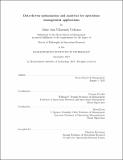Data-driven optimization and analytics for operations management applications
Author(s)
Uichanco, Joline Ann Villaranda
DownloadFull printable version (1004.Kb)
Other Contributors
Massachusetts Institute of Technology. Operations Research Center.
Advisor
Georgia Perakis and Retsef Levi.
Terms of use
Metadata
Show full item recordAbstract
In this thesis, we study data-driven decision making in operation management contexts, with a focus on both theoretical and practical aspects. The first part of the thesis analyzes the well-known newsvendor model but under the assumption that, even though demand is stochastic, its probability distribution is not part of the input. Instead, the only information available is a set of independent samples drawn from the demand distribution. We analyze the well-known sample average approximation (SAA) approach, and obtain new tight analytical bounds on the accuracy of the SAA solution. Unlike previous work, these bounds match the empirical performance of SAA observed in extensive computational experiments. Our analysis reveals that a distribution's weighted mean spread (WMS) impacts SAA accuracy. Furthermore, we are able to derive distribution parametric free bound on SAA accuracy for log-concave distributions through an innovative optimization-based analysis which minimizes WMS over the distribution family. In the second part of the thesis, we use spread information to introduce new families of demand distributions under the minimax regret framework. We propose order policies that require only a distribution's mean and spread information. These policies have several attractive properties. First, they take the form of simple closed-form expressions. Second, we can quantify an upper bound on the resulting regret. Third, under an environment of high profit margins, they are provably near-optimal under mild technical assumptions on the failure rate of the demand distribution. And finally, the information that they require is easy to estimate with data. We show in extensive numerical simulations that when profit margins are high, even if the information in our policy is estimated from (sometimes few) samples, they often manage to capture at least 99% of the optimal expected profit. The third part of the thesis describes both applied and analytical work in collaboration with a large multi-state gas utility. We address a major operational resource allocation problem in which some of the jobs are scheduled and known in advance, and some are unpredictable and have to be addressed as they appear. We employ a novel decomposition approach that solves the problem in two phases. The first is a job scheduling phase, where regular jobs are scheduled over a time horizon. The second is a crew assignment phase, which assigns jobs to maintenance crews under a stochastic number of future emergencies. We propose heuristics for both phases using linear programming relaxation and list scheduling. Using our models, we develop a decision support tool for the utility which is currently being piloted in one of the company's sites. Based on the utility's data, we project that the tool will result in 55% reduction in overtime hours.
Description
Thesis: Ph. D., Massachusetts Institute of Technology, Sloan School of Management, Operations Research Center, 2013. This electronic version was submitted by the student author. The certified thesis is available in the Institute Archives and Special Collections. Cataloged from student-submitted PDF version of thesis. Includes bibliographical references (pages 163-166).
Date issued
2013Department
Massachusetts Institute of Technology. Operations Research Center; Sloan School of ManagementPublisher
Massachusetts Institute of Technology
Keywords
Operations Research Center.